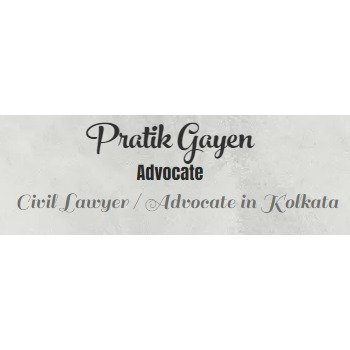Best Child Visitation Lawyers in Kolkata
Share your needs with us, get contacted by law firms.
Free. Takes 2 min.
Free Guide to Hiring a Family Lawyer
List of the best lawyers in Kolkata, India
About Child Visitation Law in Kolkata, India
Child visitation laws in Kolkata, India fall under the broader domain of family law, which is primarily governed by the guardianship and custody guidelines outlined in the Hindu Minority and Guardianship Act, the Guardians and Wards Act, and relevant guidelines from the Indian judiciary. In cases of separation or divorce, child visitation refers to the legal right granted to the non-custodial parent to spend time with their child. The primary focus of child visitation laws is to ensure the best interests of the child, aiming to provide a stable and nurturing relationship with both parents.
Why You May Need a Lawyer
There are several situations where a lawyer's expertise might be essential in matters of child visitation:
- Establishing Visitation Rights: If parents are unable to amicably agree on visitation schedules, legal intervention may be necessary.
- Modifying Visitation Orders: Life circumstances change, and existing visitation schedules may need adjustments.
- Enforcing Visitation: If one parent is not complying with court-approved visitation, legal enforcement may be required.
- Concerns About Child Safety: If a parent believes the child's safety is at risk during visits with the other parent, they might seek legal advice to address these concerns.
- Parental Relocation: If a custodial parent intends to move to a different city or country with the child, affecting visitation, legal help may be necessary to negotiate new terms.
Local Laws Overview
The local laws relevant to child visitation within Kolkata are largely influenced by broader Indian legislation. Key aspects include:
- The Best Interest of the Child: Courts focus on what arrangement serves the child's physical, emotional, and educational needs best.
- Guardians and Wards Acts: Governs the process of appointing guardians and setting terms for custody and visitation.
- Court Discretion: Kolkata courts have the authority to customize visitation based on individual cases and changing circumstances.
- Mediation: Encouraged as a first step, promoting mutually agreeable solutions outside of court.
Frequently Asked Questions
What is the difference between custody and visitation?
Custody refers to the legal rights and responsibilities regarding the child's care and upbringing. Visitation is the schedule set for the non-custodial parent to spend time with the child.
Can a custodial parent deny visitation if child support is not paid?
No, visitation rights and child support are separate issues. Non-payment of child support should be addressed legally, but it does not justify denying visitation.
How can visitation rights be modified in Kolkata?
To modify visitation rights, you generally need to apply through the Family Court. The court will consider the request based on changed circumstances and the child's best interests.
What if my child doesn’t want to visit the other parent?
The child's preference may be considered, especially if they are mature enough to express reasoned opinions. However, the court will ultimately decide based on the overall welfare of the child.
How is visitation enforced if one party doesn’t comply?
If a party doesn't comply with visitation orders, a contempt of court application can be filed. The court can enforce compliance through legal action.
Are online or phone visitations allowed?
Yes, virtual visitation can be an option if agreed upon by both parties or mandated by the court, particularly if physical visitation poses challenges.
Can grandparents seek visitation rights in Kolkata?
In certain circumstances, grandparents may petition for visitation rights if it is in the child's best interest and if their involvement contributes to the child’s welfare.
What happens if I need to relocate with my child?
Relocation can significantly affect visitation. It usually requires court approval or a new agreement with the other parent, focusing on maintaining the child’s relationship with both parents.
How does the court decide a visitation schedule?
The court considers factors such as the child's schooling, the parent's work schedules, and both parents' availability, aligning with the child's best interests.
Do I need a lawyer for mediation?
While a lawyer is not required for mediation, having legal guidance can be beneficial to ensure your interests and the child’s best interests are fairly represented.
Additional Resources
Those seeking further assistance in Kolkata can consider the following resources:
- Calcutta High Court: For legal proceedings and queries related to visitation disputes.
- West Bengal Legal Services Authority: Provides legal aid to eligible individuals for matters involving child visitation.
- Local Family Courts: For filing cases and processes related to custody and visitation rights.
- Childline India Foundation: For concerns about child safety during visitation.
Next Steps
If you need legal assistance regarding child visitation in Kolkata, here are some steps to consider:
- Consult a Family Lawyer: Engage a lawyer experienced in family law to understand your rights and options.
- Gather Relevant Documentation: Collect all necessary documents including previous court orders, agreements, and communication records.
- Consider Mediation: Explore mediation with a professional mediator to negotiate terms amicably.
- File a Petition: If an agreement isn’t possible, consider filing a petition in family court for formal arrangements.
- Attend Court Hearings: Be prepared to attend all court hearings and follow legal advice for optimal outcomes.
Lawzana helps you find the best lawyers and law firms in Kolkata through a curated and pre-screened list of qualified legal professionals. Our platform offers rankings and detailed profiles of attorneys and law firms, allowing you to compare based on practice areas, including Child Visitation, experience, and client feedback.
Each profile includes a description of the firm's areas of practice, client reviews, team members and partners, year of establishment, spoken languages, office locations, contact information, social media presence, and any published articles or resources. Most firms on our platform speak English and are experienced in both local and international legal matters.
Get a quote from top-rated law firms in Kolkata, India — quickly, securely, and without unnecessary hassle.
Disclaimer:
The information provided on this page is for general informational purposes only and does not constitute legal advice. While we strive to ensure the accuracy and relevance of the content, legal information may change over time, and interpretations of the law can vary. You should always consult with a qualified legal professional for advice specific to your situation.
We disclaim all liability for actions taken or not taken based on the content of this page. If you believe any information is incorrect or outdated, please contact us, and we will review and update it where appropriate.
















